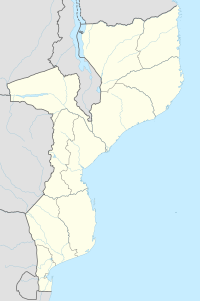Pemba, Mozambique
Pemba | |
|---|---|
 | |
| Coordinates: 12°58′S 40°33′E / 12.967°S 40.550°E | |
| Country | |
| Provinces | Cabo Delgado Province |
| District | Pemba-Metuge District |
| City Status | 1904 |
| Area | |
• Total | 19.79 km2 (7.64 sq mi) |
| Elevation | 30 m (100 ft) |
| Population (2007) | |
• Total | 141,316 |
| • Density | 7,100/km2 (18,000/sq mi) |
| Area code | (+258) 272 |
| Climate | Aw |
Pemba is a port city in Mozambique. It is the capital of the province of Cabo Delgado and lies on a peninsula in Pemba Bay.
The town was founded by the Niassa Company in 1904 as Porto Amélia, after the Queen of Portugal, at the peninsula's south western tip and has grown around a port. The city is renowned for its Portuguese colonial architecture.[1] It was renamed Pemba at the end of Portuguese rule, in 1975.
The city's inhabitants are primarily Swahili, Makondes, Macuas and Mwanis. Local languages that are spoken are Kimwani and Macua, although Portuguese is widespread.
In the centre of Pemba, there is an authentic local market or Souk, where arts and crafts, as well as traditional silverware can be bought.
Pemba is also renowned as being a prime destination for water sport and diving enthusiasts as a coral reef lies close to the shore. Pemba has increasingly become a tourist destination, particularly for upper-middle class Mozambicans and South Africans. There is now a weekly flight from Johannesburg to Pemba, a hotel, the Pemba Beach Hotel, restaurants, and other forms of entertainment. Pemba is the closest major city and airport for those who wish to visit Quirimbas Islands and Quirimbas National Park.
International Relations
Pemba is twinned with:
Demographics
| Year | Population[2] |
|---|---|
| 1986 | 50 215 |
| 1997 | 88 149 |
| 2007 | 141 316 |
Port
Pemba is a potential site for a deep water port.[3]
Climate
The coastal city of Pemba in northern Mozambique experiences a humid equatorial climate with a dry winter (Koppen Aw). Temperatures fluctuate only several degrees throughout the year due to the city's tropical location and considerable proximity to the equator. Precipitation-wise, however, two seasons comprise the year: the dry season and the wet season. The wet seasons spans from December to April, and brings fairly prodigious and reliable rainfall, with the wettest month of the year typically being March at 202.2 mm (7.96 in) of average total monthly precipitation. Conversely, the dry season stretches from May to November and brings marginally cooler temperatures, sunny skies, and stupendously low rainfall, with the driest month of the year typically being September at 2.2 mm (0.09 in) of average total monthly precipitation. Humidity is very high during the wet season, averaging 80-90%, but is much lower in the dry season. The warmest and coolest months of the year are January/February and July respectively.
| Climate data for Pemba, Mozambique | |||||||||||||
|---|---|---|---|---|---|---|---|---|---|---|---|---|---|
| Month | Jan | Feb | Mar | Apr | May | Jun | Jul | Aug | Sep | Oct | Nov | Dec | Year |
| Record high °C (°F) | 34.5 (94.1) |
34.5 (94.1) |
36.0 (96.8) |
33.4 (92.1) |
33.5 (92.3) |
31.5 (88.7) |
30.6 (87.1) |
31.8 (89.2) |
33.4 (92.1) |
33.6 (92.5) |
35.2 (95.4) |
35.7 (96.3) |
36.0 (96.8) |
| Mean daily maximum °C (°F) | 30.8 (87.4) |
30.9 (87.6) |
30.8 (87.4) |
30.4 (86.7) |
29.5 (85.1) |
28.3 (82.9) |
27.7 (81.9) |
27.8 (82.0) |
28.7 (83.7) |
29.5 (85.1) |
30.4 (86.7) |
30.8 (87.4) |
29.6 (85.3) |
| Mean daily minimum °C (°F) | 23.2 (73.8) |
23.1 (73.6) |
22.8 (73.0) |
22.0 (71.6) |
20.3 (68.5) |
18.6 (65.5) |
18.2 (64.8) |
19.6 (67.3) |
19.8 (67.6) |
21.6 (70.9) |
23.0 (73.4) |
23.5 (74.3) |
21.3 (70.3) |
| Record low °C (°F) | 21.5 (70.7) |
21.4 (70.5) |
21.7 (71.1) |
20.0 (68.0) |
18.3 (64.9) |
16.9 (62.4) |
16.9 (62.4) |
16.5 (61.7) |
18.5 (65.3) |
20.0 (68.0) |
21.5 (70.7) |
21.4 (70.5) |
16.5 (61.7) |
| Average precipitation mm (inches) | 146.4 (5.76) |
156.0 (6.14) |
202.2 (7.96) |
122.0 (4.80) |
32.4 (1.28) |
15.0 (0.59) |
11.3 (0.44) |
7.9 (0.31) |
2.2 (0.09) |
11.3 (0.44) |
41.6 (1.64) |
124.5 (4.90) |
872.8 (34.36) |
| Average precipitation days (≥ 1.0 mm) | 11.0 | 10.4 | 12.6 | 9.4 | 3.2 | 2.4 | 1.6 | 1.2 | 0.6 | 1.5 | 3.6 | 8.4 | 65.9 |
| Average relative humidity (%) | 80 | 82 | 81 | 76 | 74 | 72 | 71 | 71 | 72 | 73 | 74 | 77 | 75 |
| Mean monthly sunshine hours | 201.5 | 175.2 | 201.5 | 216.0 | 238.7 | 225.0 | 226.3 | 260.4 | 261.0 | 288.3 | 276.0 | 232.5 | 2,802.4 |
| Mean daily sunshine hours | 6.5 | 6.2 | 6.5 | 7.2 | 7.7 | 7.5 | 7.3 | 8.4 | 8.7 | 9.3 | 9.2 | 7.5 | 7.7 |
| Source 1: World Meteorological Organization[4] | |||||||||||||
| Source 2: Deutscher Wetterdienst (extremes, humidity and sun)[5] | |||||||||||||
See also
External links
References
- ^ PORTO AMÉLIA-PEMBA, a film of Porto Amélia, Portuguese Mozambique
- ^ "Mozambique: largest cities and towns and statistics of their population". World Gazetteer. Retrieved 2008-06-18.
- ^ Railways Africa - UPGRADING PORT AT PEMBA
- ^ "World Weather Information Service–Pemba". World Meteorological Organization. Retrieved April 19, 2017.
- ^ "Klimatafel von Pemba (Porto Amélia) / Mosambik" (PDF). Baseline climate means (1961-1990) from stations all over the world (in German). Deutscher Wetterdienst. Retrieved April 19, 2017.

